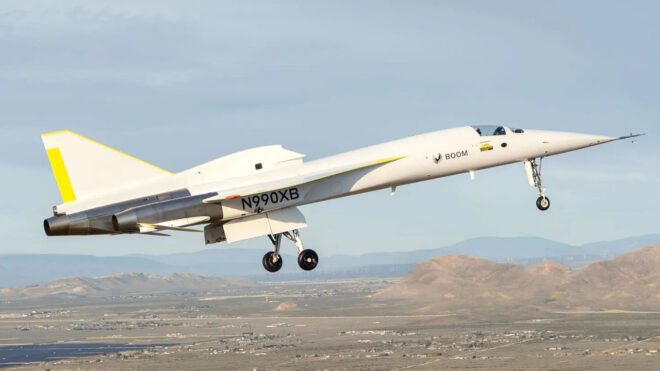supersonic Passenger planes will enter our lives once again in the near future. One of the most important candidates in this regard Boom XB-1.
After Concorde and what happened to it supersonic traveller planes He left our lives. On the military side, of course, flights above the speed of sound continue, but civil aviation is deprived of this high speed. As we said above, this sad situation will change in the near future. Because now many companies, especially business jet It is trying to carry passengers above the speed of sound again. One of the companies working on this subject is Boom Supersonicin 2020 XB-1 named after prototype your plane had showcased it. It was reported that this aircraft would then be a test platform for the full-size version, and the prototype Mach 2.2 It was announced that it could reach a speed of (2,700 km/h). Then in the model General Electric It was stated that it uses three J8-15 turbojet engines produced by . What brought the Boom XB-1 model to the agenda now was the first flight test. The flight, which you can watch in the video below, was performed by test pilot Bill “Doc” Shoemaker and was completed without any problems. Of course, the limits were not pushed in the first flight test; the aircraft reached an altitude of 2,170 meters and a speed of 440 km/h was not exceeded. Explaining that 1 Mach speed will be exceeded in subsequent tests and that they will gradually increase the speed, Boom said that the XB-1 used in the tests 19 meters long And 6 meter wingspan He announced that he had.
YOU MAY BE INTERESTED IN
NASA is also involved in this field, the institution specifically LockheedMartin with X-59 QueSST working on it. The test aircraft aims to improve the new generation of supersonic passenger aircraft, especially focuses on the silent journey. Because the supersonic passenger plane was shelved after the bad events that happened to it. concordeWhen it exceeds the speed of sound, it creates a huge “sonic boom” was creating an explosion. Here are the people who want this to be brought to a level that will not disturb the cities below. NASAMoreover in supersonic (1,513 km/h) cruise noise It also aims for a serious reduction (up to 75 dB).
